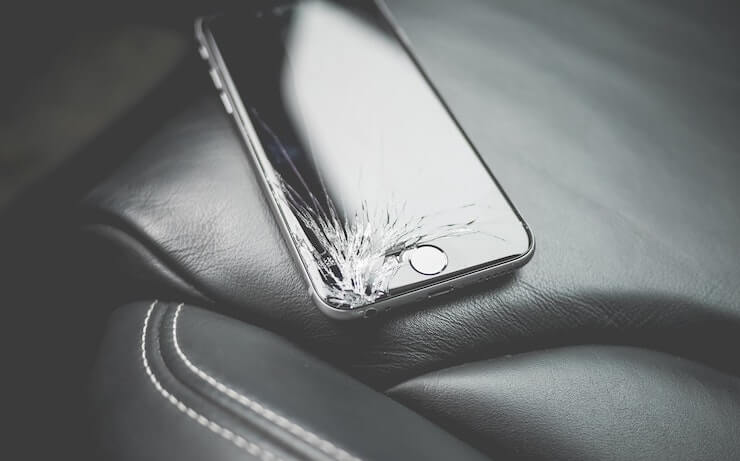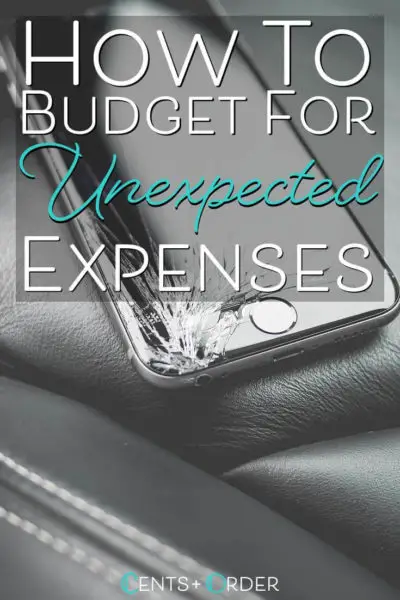Budgets are incredibly useful, but it’s important to remember that while they look great on paper, they don’t always go according to plan.
Sometimes things remain in our control: you have to exercise rigorous discipline to buy only the essentials at the grocery store or risk driving your food budget through the roof, for example. But other times we’re hit with the unexpected, and these expenses can really wreck your budget.
Table of Contents
Examples of Unexpected Expenses
The first step towards budgeting for unexpected expenses is to know what they are. Once you are aware of the most common unexpected expenses that plague households, you can prepare for them. Once these expenses are on your radar, they really aren’t “unexpected” anymore. A better term for them would probably be “irregular” expenses.
Here is a list of common irregular expenses that you will need to be thinking about and preparing for.
1. Back-to-School
If you have children, your expenses will increase in the fall when your kids head back to school.
Outfits, shoes, backpacks, lunch boxes, pencils, notebooks, folders, binders, calculators and even the ominous tissue boxes and hand sanitizer dispensers that grace every school’s supply list are enough to frazzle any parent. And if you have several school-aged children, you can kiss extra cash for the month goodbye, unless you shop wisely and plan ahead for the back to school frenzy.
2. Broken Electronics
I can remember back when I was in college I was studying one day in a coffee shop. I turned to say “Hi” to someone I knew and I accidentally knocked into my coffee cup with my elbow. An entire cup of coffee spilled directly on to my laptop keyboard.
Two days later I was spending over $400 at Best Buy for a new computer. Today, phones are an integral part of our work and personal lives. Yet they can be dismally fragile devices. With one ill-fated drop, your phone can suffer a shattered screen or destructive water damage. It seems like electronics are built to be broken. Yet the moments they break are always when we seem to least expect them to.
3. Car Repairs
Every mile that you drive brings you one mile closer to your next break-down. I know that sounds incredibly pessimistic, but unfortunately, it’s also true. It’s not a questions of “if” your car will need repairs, but when. And if you don’t want your next car repair to add severe financial stress and anxiety to your life, you need to be thinking about saving for car repairs on a monthly basis.
4. Clothing
Few of us spend the same amount of money on clothes each month, but instead tend to add to our wardrobe in big spurts. For most of us, are clothes-buying sprees tend to pop up when we are transitioning from one season to another, like from summer to fall.
In September, for example, you may buy no clothes at all, but in October you may all of the sudden need to buy sweaters and jackets to deal with the colder weather.
5. Holidays
Unless you’re a complete scrooge, you’ll be hitting the shops to buy holiday gifts for your family throughout the year. Birthdays and major religious festivals are the main occasions for gift-giving, and if you have a large family, that’s enough to make you plow through an entire paycheck simply from buying tokens of appreciation. Budget for the holidays or get creative.
6. Home Repairs
Whether it’s something small like a leaky faucet or large like a broken-down AC unit, when you own a home you can guarantee that you are going to have repairs.
Just last month, the hot water water in my home gave up the ghost and had to be replaced. Issues like these are stressful enough on their own without having to deal with worrying about where the money is going to come from to pay for the repair.
7. Medical Bills
Sicknesses and accidents pop up in the least opportune times. I learned this first hand last year when our 1-year old son had an emergency room visit during our vacation in Philadelphia. In the middle of the night, he he was hit with a terrible croup attack that nearly stopped his breathing.
After taking him to the nearest hospital to our hotel, they transported him by ambulance to Children’s Hospital of Philadelphia. I never expected to be sitting in a hospital room with my son on our vacation, but it perfectly illustrated the fact that medical emergencies simply don’t follow our schedules. They will happen when you least expect them.
8. Weddings
A wedding is a major event in a person’s life, and if you’ve been honored with an invitation, it’s important for you to make every effort to get there, even if you live out of town. Travel costs, clothing and gifts for the happy couple can all be expensive. Keep an eye on your cousins, nieces, nephews, children or grandchildren.
If any are in a serious relationship, it’s only a matter of time before a wedding is announced. Make a note of it in your budget.
How to Prepare for Unexpected Expenses
Are you ready for these unexpected expenses? Here are some ways to prepare yourself and your budget for the unknown.
1. Look to the Past to Prepare for the Future
One of the advantages that you get from saving all your receipts is that it gives you the opportunity to look back over time at your spending patterns. For as long as I can remember, my dad has religiously saved every receipt from every purchase he’s ever made for this very purpose.
There’s only one problem with this. If you are the kind of highly motivated person (like my dad) who saves every receipt, then planning and organization probably isn’t your weakness in the first place.
But there is hope for all the rest of us normal earthlings who are never going to have the discipline to save every receipt, but still want to get better at planning for unexpected expenses. You can access to the same spending pattern data by simply using one of the many online budgeting tools that can connect to your bank accounts and credit cards.
Mint, YNAB (You Need a Budget), and Personal Capital are 3 of the most popular budgeting tools that offer this functionality, but there are many more.
2. Utilizing Budgeting Tools
If you are struggling with planning for irregular expenses, you need to start using one of these budgeting tools immediately. It’s important that every single expense is accounted for and not overlooked.
Once you have some data to work with, use that information to formulate an educated guess about how much money you will spend on each irregular expense during a given 12-month span. Once you have that number, divide it by 12. That’s how much you want to put away on a monthly basis for each individual irregular expense.
For example, let’s pretend that after examining your spending history you see that you spend about $600 a year on clothing. When you divide $600 by 12, you get $50. This is how much you should try to budget for clothes each month. On months that you use less than the full $50, you can roll the left-over amount to the next month.
3. Automatically Incorporate Extra Expenses Into Your Budget
It’s a good idea to round up when budgeting. You think you’ll only spend $100 on groceries for the week? Budget for $125 anyway.
This can help you be prepared for small, everyday unexpected expenses. At the time it doesn’t seem like much if you spend an extra $10 at the store, but if you spend an extra $10 every time you go out, it will add up quickly.
Different ways to factor unexpected expenses into your budget
First, prepare your baseline budget. In other words, create a budget that can support your lifestyle without demanding too much sacrifice and without being excessively lavish. Don’t worry about factoring in extra expenses just yet.
Next, trim down your baseline budget to create your bare-bones budget. This is a budget that may require some sacrifices on your part (less money toward entertainment or traveling, for example) but will nonetheless meet the requirements of your daily life and will pay your bills.
Then, take your ideal budget in the opposite direction and round everything up. If you think you’d spend $225 on your electric bill, round it up to $300. Consider this your “ballooned” budget that takes into account hidden, unexpected expenses.
Now that you have the three budgets mapped out, put them to good use. Here’s a suggested method:
- Consult your ballooned budget when paying bills. If you pay $250 on that electric bill rather than the $300 you marked down in your budget, set aside the extra $50 into an emergency fund.
- Consult your baseline budget when paying for any extra luxuries, like vacations. Try to stay below the baseline budget for these expenses. For example, if you have $2000 in your baseline budget for a trip, try to stay below $2000 when making all of your plans and reservations. And if your ballooned budget shows $3000 for trips, set aside the difference (in this case, $1000) between the two budgets into an emergency fund.
- Your bare-bones budget should give you your guiding parameters in the event of an honest-to-goodness emergency. Spend money on only the essentials for day-to-day life so that any leftover money can be used for the crisis that has appeared in your life.
Using these three budgets as a guide, you will have not only a built-in cushion for smaller unexpected expenses, but also the means to start and maintain a robust emergency fund.
Conclusion
The bottom line is that you want to turn as many unexpected expenses as possible into expected expenses.
Once you do, you will feel calm and prepared when irregular expenses surface and will find yourself dipping into your emergency fund much less often to pay for them.
If you have other strategies that you use to prepare for unexpected expenses, we’d love to hear about it on Facebook or Twitter!


